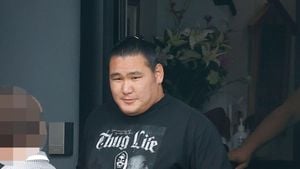Washington — President Donald Trump and French President Emmanuel Macron met Monday at the White House to discuss peace negotiations and collective security efforts surrounding the war between Russia and Ukraine. This meeting occurred on the third anniversary of Russia’s invasion of Ukraine, marking a historic moment amid shifting U.S. foreign policy.
Trump characterized the bilateral discussions as "an important step" toward finding peace. He expressed optimism about the possibility of ending the conflict, stating, "I really believe he wants to make a deal. I may be wrong, but I believe he wants to make a deal." Macron, recognizing the historical ties between the U.S. and France, reiterated the commitment of both nations to assure security for Ukraine, telling reporters, "This peace must not mean a surrender of Ukraine. It must not mean a ceasefire without guarantees."
During their joint news conference, Trump emphasized the urgent need to restore peace: "The horrors of this gruesome and bloody war can scarcely be underestimated," he noted, highlighting the casualties on both sides. He expressed hope for achieving a ceasefire with Russia soon, claiming, "It’s time to end this bloodletting and restore peace, and I think we’re going to do it."
Macron's visit is pivotal as he is the first European leader to engage Trump directly since his return to the White House. Their dialogue appealed for continued commitment to supporting Ukraine, amid fears of Trump's willingness to pivot toward Russia—a concern for many European leaders. Macron stated the necessity of strong security guarantees for Ukraine, implying skepticism of Trump’s previous approach.
While Trump touted his ability to negotiate with Russian President Vladimir Putin, claiming to have made contact with him already, he did not shy away from expressing controversial views about Ukrainian President Volodymyr Zelenskyy. Trump referred to Zelenskyy as "a dictator" and declined to demand concessions from Russia during the negotiations, causing concern among those advocating for Ukraine’s sovereignty.
Macron worked to balance Trump’s rhetoric, emphasizing European readiness to contribute security resources to Ukraine. He conveyed to reporters, "Being strong and having deterrence capacities is the only way to be sure it will be respected," reinforcing Europe's reliance on U.S. military backing.
The meeting underscored the shifting dynamics of international alliances as Trump highlighted potential deals concerning Ukraine's rare earth minerals. He indicated the U.S. and Ukraine are "very close" to finalizing such agreements, which would result largely from American funding to bolster Ukraine's military without repeating previous financial expenditures without direct benefits.
Trump's repeated assertions of negotiating aid deals as transformative have drawn scrutiny. He stated, "Once we settle, there’s going to be no more war in Ukraine," downplaying skepticism from leaders accustomed to multi-lateral dialogues. His remarks suggested potential U.S.-Ukrainian financial agreements were within reach.
The backdrop of Monday's discussions was intertwined with controversy over U.S. foreign policy, particularly following reports of Washington's delegation voting against UN resolutions condemning Russian actions. This decision sparked outrage among allies who are committed to holding Russia accountable for its invasion.
Macron, who has taken the lead among European leaders seeking unity on the Ukraine issue, appeared cautious yet optimistic about Trump's intent and cooperative opportunities moving forward. He remarked, "We will support Ukraine's sovereignty and work collectively for lasting security arrangements. We’ve paid 60% of the total efforts,” correcting Trump when he suggested Europe was merely providing loans to Ukraine.
The pair’s divergent positions were evident when Macron noted the need for European countries to fulfill roles as peacekeepers if negotiations with Russia yield fruitful results. "They would not be along the front lines," he clarified, emphasizing, "They would be there to assure peace is respected," as Trump co-signed the necessity of European presence under such conditions.
A central theme of their interaction remained the pledge from the U.S. to balance traditional alliances with new assertiveness. Trump's proposals indicated he could take the lead on various fronts, including enhancing the U.S.'s positioning on global trade and tariffs, which involve discussions surrounding reciprocal arrangements with European partners.
With significant decisions brewing, Trump is set to engage with U.K. Prime Minister Keir Starmer later this week, continuing the delicate dance of diplomacy where supporting Ukraine on one side is scrambled against his growing affection for Russian strategies on the other.
These events collectively galvanize the geopolitical narrative of the 21st century—how the U.S. confronts its role as the traditional leader of Western alliances amid the realities posed by Putin's Russia and shifting priorities dictated by Trump’s administration.
The future remains uncertain as the war’s toll reverberates beyond borders, but the gestures from leaders like Trump and Macron could illuminate pathways to peace—or deepen divisions among allies fighting for stability across Europe.



